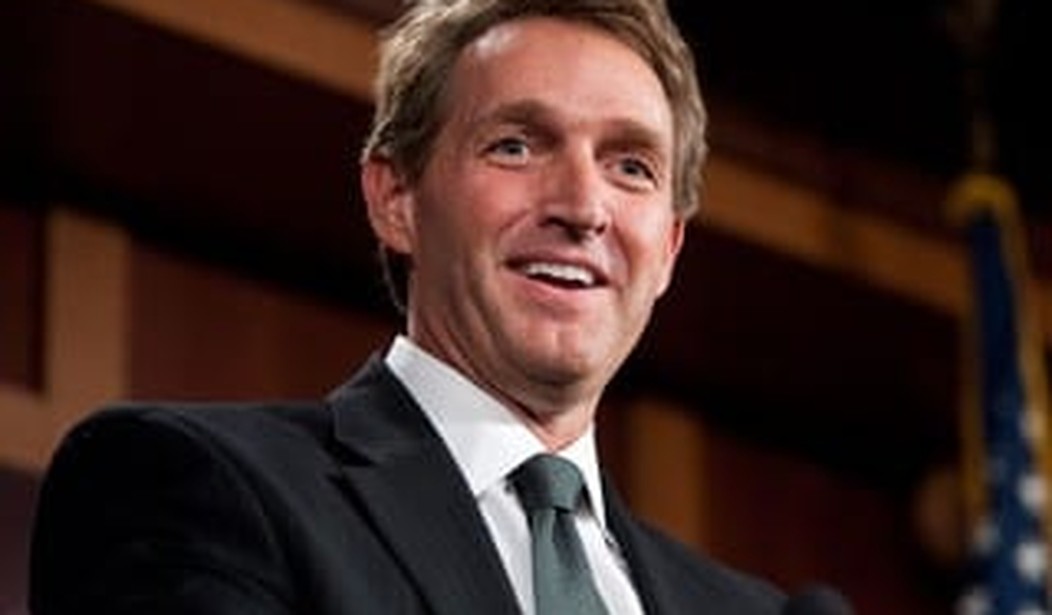WASHINGTON – Sen. Jeff Flake (R-Ariz.) urged Republicans to set aside their distrust of President Obama and vote to give his administration trade-promotion powers to negotiate trade agreements.
“Republicans need to resist the temptation to buy the misleading narrative that TPA [trade promotion authority] would simply give away the store to the Obama administration,” Flake said at the American Enterprise Institute on Thursday. “Distaste for Mr. Obama isn’t enough to justify opposition to trade pacts that would raise U.S. living standards.”
Flake said the best-case scenario is that Congress will turn its attention to trade in the next few months before the midterm election cycle begins.
“There’s little chance of positive outcomes on trade decisions when those decisions are made in the months just before November in an election year,” he said.
The Arizona Republican said that bilateral and regional free-trade agreements are more important than ever for economic competitiveness.
He cited many reasons why free trade makes the U.S. more competitive, including leveling the playing field for U.S. companies, promoting competition, and increasing access to foreign markets. But firms are not the only ones that reap the rewards of free trade, Flake added; consumers also benefit from access to cheaper products and workers gain from a more robust labor market.
“Free trade is one of the essential tools for creating jobs,” he said.
According to the U.S. Chamber of Commerce, 95 percent of the world’s consumers are outside of U.S. borders. In addition, 80 percent of the world’s purchasing power and 92 percent of global economic growth lies outside of the U.S.
It is estimated that more than half of the goods imported into the U.S. each year are not final consumer products that American families buy at the store, but inputs used by companies that make final products in the U.S.
“Imports not only stretch dollars for consumers at the cash register; cheaper inputs also allow U.S. industry to be more globally competitive,” Flake said.
According to the U.S. Trade Representative’s Office, the United States is the world’s largest exporter and importer of goods and services, exporting nearly $2.2 trillion in goods and services last year. Nearly half of the nation’s exports go to its free-trade agreement partners and these countries comprise only one-tenth of the world’s economy.
Flake noted that approval of a major free-trade agreement without TPA has only happened once, when the Congress approved a bilateral deal with Jordan signed in 2000. He said that deal happened more because of geopolitical and security concerns rather than commercial reasons.
“We need to have TPA for free-trade agreements,” Flake said.
Flake said renewing the TPA would not only help Obama’s trade policy but also the next president’s, adding that Republicans should focus on why the president has not pursued a more aggressive free-trade agenda.
TPA was last granted to President George W. Bush in 2002, and it expired in 2007. The last trade promotion debate, in 2002, was narrowly approved by a 215-212 vote in the House.
TPA, which would allow the White House to put trade agreements before Congress for an up or down vote without amendments, is considered crucial to paving the way for major deals with European and Pacific Rim trading partners.
Obama needs Republican support on the TPA because so many Democrats oppose free-trade agreements due to concerns about job losses and other problems for constituents.
Groups opposed to the Asia Pacific trade deal, known as the Trans-Pacific Partnership (TPP), are many – including 151 Democrats in the House who have complained about the lack of transparency in the trade negotiations.
Many major unions and civil society groups are skeptical that many of the benefits will ever materialize.
Many Republicans, particularly those with ties to the tea party, are wary of international pacts, and oppose them on constitutional grounds. They argue that since the Constitution explicitly gives Congress the power of collecting taxes and import duties, it is unconstitutional to give the executive branch authority over international trade.
Flake said those that oppose granting the executive branch trade-promotion powers offer the “canard” that doing so is inconsistent with the Constitution because it cedes Congress’ authority to regulate international trade to the president. He said the Constitution clearly accords the executive branch the role to negotiate treaties with foreign countries.
“Free-trade agreements involve a dovetailing of the responsibilities of the Congress and the executive branch,” he said. “TPA makes this possible.”
The Republican and Democratic chairmen of the Senate Finance Committee and the House Ways and Means Committee are working on fast-track legislation expected to be introduced early in 2014.
After missing a year-end deadline to finalize the agreement, the U.S. and other TPP members announced last week negotiations will resume early next year.









Join the conversation as a VIP Member